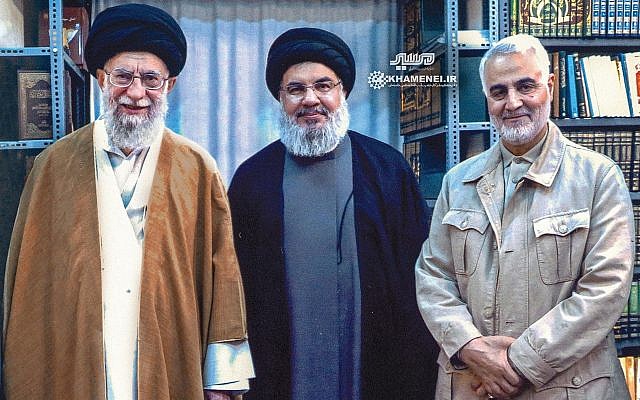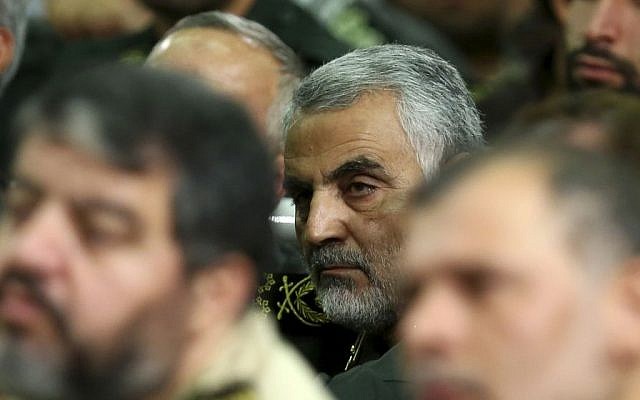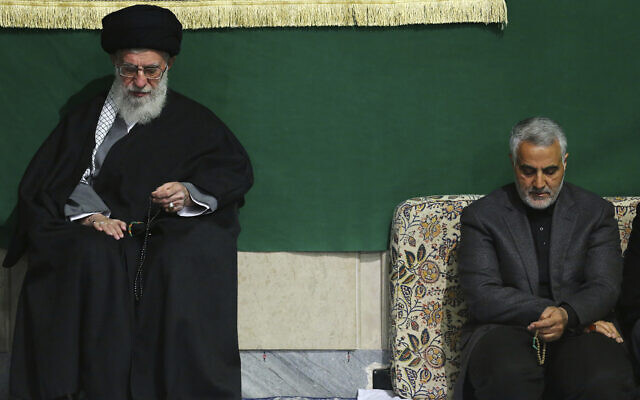TEHRAN, Iran — Revolutionary Guards commander Qassem Soleimani, who was killed Friday in a US strike, was one of the most popular figures in Iran and seen as a deadly adversary by America and its allies.
General Soleimani, who headed the external operations Quds Force for the Guards, had wielded his regional clout publicly since 2018 when it was revealed that he had direct involvement in top-level talks over the formation of Iraq’s government.
It was no surprise at the time for a man who has been at the center of mediating powerful relationships in the region for two decades.
Soleimani has been in and out of Baghdad ever since, most recently last month as parties sought to form a new government.
Where once he kept to the shadows, Soleimani has in recent years become an unlikely celebrity in Iran — replete with a huge following on Instagram.
His profile rose suddenly when he was pushed forward as the public face of Iran’s intervention in the Syrian conflict from 2013, appearing in battlefield photos, documentaries — and even being featured in a music video and animated film.

An image published on Ali Khamenei’s official website on September 25 showing Khamenei, the Iranian supreme leader, left, alongside Hezbollah chief Hassan Nasrallah, center, and Islamic Revolutionary Guards Corps Quds Force commander Qassem Soleimani. (Khamenei.ir)
In a rare interview aired on Iranian state television in October, he said he was in Lebanon during the 2006 Israel-Hezbollah war to oversee the conflict.
To his fans and enemies alike, Soleimani was the key architect of Iran’s regional influence, leading the fight against jihadist forces and extending Iran’s diplomatic heft in Iraq, Syria and beyond.
“To Middle Eastern Shiites, he is James Bond, Erwin Rommel and Lady Gaga rolled into one,” wrote former CIA analyst Kenneth Pollack in a profile for Time’s 100 most influential people in 2017.
“To the West, he is… responsible for exporting Iran’s Islamic revolution, supporting terrorists, subverting pro-Western governments and waging Iran’s foreign wars,” Pollack added.

Iranian demonstrators hold a portrait of Maj. Gen. Qassem Soleimani, commander of the Quds Force in the Iranian Revolutionary Guards and a central figure in the violent spread of Iran’s revolution. Photo taken in Tehran’s Azadi Square, February 11, 2015. (Behrouz Mehri/AFP)
With Iran roiled by protests and economic problems at home, and the US once again mounting pressure from the outside, some Iranians had even called for Soleimani to enter domestic politics.
While he dismissed rumors he might one day run for president, the general played a decisive role in the politics of Iran’s neighbor, Iraq.
As well as talks on forming a government, he was pivotal in pressuring Iraq’s Kurds to abandon their plans for independence after an ill-judged referendum last September.
Soleimani’s luck ran out after being rumored dead several times in his life. Those incidents included a 2006 airplane crash that killed other military officials in northwestern Iran and a 2012 bombing in Damascus that killed top aides of Assad. More recently, rumors circulated in November 2015 that Soleimani was killed or seriously wounded leading forces loyal to Assad as they fought around Syria’s Aleppo.
Decision-maker
His influence has deep roots, since Soleimani was already leading the Quds Force when the US invaded Afghanistan in 2001.
“My Iranian interlocutors on Afghanistan made clear that while they kept the foreign ministry informed, ultimately it was General Soleimani that would make the decisions,” former US ambassador to Iraq Ryan Crocker told the BBC in 2013.
His firm but quiet presence played perfectly to the Iranian penchant for dignified humility.
“He sits over there on the other side of room, by himself, in a very quiet way. Doesn’t speak, doesn’t comment, just sits and listens. And so of course everyone is thinking only about him,” a senior Iraqi official told the New Yorker for a long profile of Soleimani.

Qassem Soleimani, commander of the Quds Force in the Iranian Revolutionary Guard, attends a meeting of Guard commanders in Tehran, Iran, September 17, 2013. (AP/Office of the Iranian Supreme Leader, File)
A survey published in 2018 by IranPoll and the University of Maryland — one of the few considered reliable by analysts — found Soleimani had a popularity rating of 83 percent, beating President Hassan Rouhani and Foreign Minister Mohammad Javad Zarif.

This photo released by the Iraqi Prime Minister Press Office shows a burning vehicle at the Baghdad International Airport following an airstrike in Baghdad, Iraq, early Friday, Jan. 3, 2020. (Iraqi Prime Minister Press Office via AP)
Western leaders saw him as central to Iran’s ties with terror groups including Lebanon’s Hezbollah and Palestinian Hamas.
Part of his appeal was the suggestion he might bridge Iran’s bitter social divides on issues such as its strict “hijab” clothing rules.
“If we constantly use terms such as ‘bad hijab’ and ‘good hijab’, reformist or conservative… then who is left?” Soleimani said in a speech to mark World Mosque Day in 2017.
“They are all people. Are all your children religious? Is everybody the same? No, but the father attracts all of them.”
Rise from humble roots
Born March 11, 1957, Soleimani was said in his homeland to have grown up near the mountainous and the historic Iranian town of Rabor, famous for its forests, its apricot, walnut and peach harvests and its brave soldiers. The US State Department has said he was born in the Iranian religious capital of Qom.
Little is known about his childhood, though Iranian accounts suggest Soleimani’s father was a peasant who received a piece of land under the Shah Mohammad Reza Pahlavi, but later became encumbered by debts.
By the time he was 13, Soleimani began working in construction, later as an employee of the Kerman Water Organization. Iran’s 1979 Islamic Revolution swept the shah from power and Soleimani joined the Revolutionary Guard in its wake. He deployed to Iran’s northwest with forces that put down Kurdish unrest following the revolution.
Soon after, Iraq invaded Iran and began the two countries long, bloody eight-year war. The fighting killed more than 1 million people and saw Iran send waves of lightly armed troops into minefields and the fire of Iraqi forces, including teenage soldiers. Solemani’s unit and others came under attack by Iraqi chemical weapons as well.
Amid the carnage, Soleimani became known for his opposition to “meaningless deaths” on the battlefield, while still weeping at times with fervor when exhorting his men into combat, embracing each individually.

In this Friday, March 27, 2015, file photo provided by an official website of the office of the Iranian supreme leader, commander of Iran’s Quds Force, Qassem Soleimani prays in a religious ceremony at a mosque in the residence of Supreme Leader Ayatollah Ali Khamenei, in Tehran, Iran (Office of the Iranian Supreme Leader via AP, File)
After the Iraq-Iran war, Soleimani largely disappeared from public view for several years, something analysts attribute to his wartime disagreements with Hashemi Rafsanjani, who would serve as Iran’s president from 1989 to 1997. But after Rafsanjani, Soleimani became head of the Quds force. He also grew so close to Khamenei that the Supreme Leader officiated the wedding of the general’s daughter.
As chief of the Quds — or Jerusalem — Force, Solemani oversaw the Guard’s foreign operations and soon would come to the attention of Americans following the 2003 invasion of Iraq and the overthrow of Saddam Hussein.
In secret US diplomatic cables released by WikiLeaks, US officials openly discussed Iraqi efforts to reach out to Soleimani to stop rocket attacks on the highly secured Green Zone in Baghdad in 2009. Another cable in 2007 outlines then-Iraqi President Jalal Talabani offering a US official a message from Soleimani acknowledging having “hundreds” of agents in the country while pledging, “I swear on the grave of (the late Ayatollah Ruhollah) Khomeini I haven’t authorized a bullet against the US.”
US officials at the time dismissed Soleimani’s claim as they saw Iran as both an arsonist and a fireman in Iraq, controlling some Shiite militias while simultaneously stirring dissent and launching attacks. US forces would blame the Quds Force for an attack in Karbala that killed five American troops, as well as for training and supplying the bomb makers whose improvised explosive devices made IED — improvised explosive device — a dreaded acronym among soldiers.

In Friday, March 27, 2015 file this photo released by an official website of the office of the Iranian supreme leader, commander of Iran’s Quds Force, Qassem Soleimani, right, sits next to the Supreme Leader Ayatollah Ali Khamenei while attending a religious ceremony in a mosque at his residence in Tehran, Iran (AP Photo/Office of the Iranian Supreme Leader, File)
In a 2010 speech, US Gen. David Petreaus recounted a message from Soleimani he said explained the scope of Iranian’s powers.
“He said, ‘Gen. Petreaus, you should know that I, Qassem Soleimani, control the policy for Iran with respect to Iraq, Lebanon, Gaza and Afghanistan,’” Petraeus said.
The US and the United Nations put Soleimani on sanctions lists in 2007, though his travels continued. In 2011, US officials also named him as a defendant in an outlandish Quds Force plot to allegedly hire a purported Mexican drug cartel assassin to kill a Saudi diplomat.
But his greatest notoriety would arise from the Syrian civil war and the rapid expansion of the Islamic State group. Iran, a major backer of Assad, sent Soleimani into Syria several times to lead attacks against IS and others opposing Assad’s rule. While a US-led coalition focused on airstrikes, several ground victories for Iraqi forces came with photographs emerging of Soleimani leading, never wearing a flak jacket.
“Soleimani has taught us that death is the beginning of life, not the end of life,” one Iraqi militia commander said.
Top stories - Google News
January 02, 2020 at 07:50PM
https://ift.tt/2ZLQK70
Qassem Soleimani, Iran's shadowy general who wielded influence like a sword - The Times of Israel
Top stories - Google News
https://ift.tt/2FLTecc
Shoes Man Tutorial
Pos News Update
Meme Update
Korean Entertainment News
Japan News Update
Bagikan Berita Ini














0 Response to "Qassem Soleimani, Iran's shadowy general who wielded influence like a sword - The Times of Israel"
Post a Comment